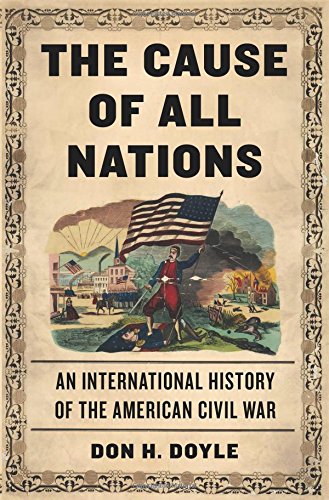
The Cause of All Nations
An International History of the American Civil War
- اطلاعات
- نقد و بررسی
- دیدگاه کاربران
نقد و بررسی

October 13, 2014
Following British Prime Minister Lord Palmerston’s dictum that “Opinions are stronger than armies,” Doyle, a professor of history at the University of South Carolina, offers an intercontinental history of the Civil War that emphasizes diplomacy and ideology over military tactics. Doyle (Secession as an International Phenomenon) sees the Civil War as a global referendum on the viability of republicanism and mass suffrage following the failure of the revolutions of 1848—a referendum acted out on a radically new field of battle thanks to the development of an international press. Neither the Union nor the Confederacy comes out looking good in Doyle’s account: the South’s struggle for recognition was hampered by incompetent diplomats; the North, insisting to Europeans that the war was precipitated by a legalistic disagreement about constitutional law, failed to capitalize on the powerful antislavery sentiments across the Atlantic until it was nearly too late. Throughout, Doyle lucidly contextualizes these dueling diplomatic missions within the larger machinations of European rulers: to quell dissent at home and reignite their own imperialist ambitions across the Atlantic. Doyle’s account, while lacking in organization, is nonetheless a readable and refreshing perspective on a conflict too often understood through a purely domestic context.

Starred review from November 1, 2014
Before and during the Civil War, both North and South lobbied hard in key European capitals to convince officials and the general population of the justness of their causes.Impressively, Doyle (History/Univ. of South Carolina; Secession as an International Phenomenon: From America's Civil War to Contemporary Separatist Movements, 2010) provides some novel insights about this most chronicled of conflicts. Although he alludes periodically to the military campaigns-from Bull Run to Appomattox-he uses them principally as reference points, signposts on his journey through the complex and fierce diplomatic efforts underway in England, France, Italy and the Vatican. Many Europeans, especially those with republican sympathies, could not understand why Abraham Lincoln, early in the war, refused to declare the North's effort as a war on slavery; Southern diplomats sought to downplay the slavery issue for their own reasons and focused on the tyranny of the North and on the Southern desire for independence. The South desperately sought political recognition from European powers and hoped for military and financial aid as well. They found precious little, and as the war wound down, the European powers backed off (some had made renewed efforts to re-establish themselves in the Western Hemisphere-France in Mexico, for example), especially when the South remained intransigent about slavery. Doyle brings onto the stage a number of figures unfamiliar to all but scholars of the Civil War-envoys and diplomats, some of whom surreptitiously sought to enlist the participation of Giuseppe Garibaldi, who was virulently opposed to slavery and who toyed somewhat with the offers to lead the Union Army. Lincoln's eloquent oratory was among the most powerful of the Union's weapons abroad, and Doyle ably conveys the widespread, genuine grief in Europe when news of his assassination arrived. An important-even necessary-addition to the groaning shelves of Civil War volumes.
COPYRIGHT(2014) Kirkus Reviews, ALL RIGHTS RESERVED.

Starred review from November 15, 2014
Doyle (history, Univ. of South Carolina; New Men, New Cities, New South: Atlanta, Nashville, Charleston, Mobile, 1860-1910) proffers an examination of the Civil War from multiple European perspectives. Although the work includes some diplomatic history for context, the primary focus is on the public square. Some individuals questioned the role of slavery as a cause of the war. They correctly noted that if the fight was about slavery, why did Abraham Lincoln in his first inaugural address promise not to interfere with slavery in the Southern states? Others viewed the war as a moratorium on the sustainability of republican government. That the first and longest-running government managed by representatives of the general populace had fractured into a civil battle was viewed by some as proof that "the people" were incapable of preserving liberty over time. With many questions being posed in the public square by citizens from different classes and countries, agents of both the Union and the South worked to shape mass opinion to serve their nation's interest. VERDICT This fascinating work on the impact of the Civil War on the Atlantic world is an essential read for anyone interested in the conflict. Readers should also consider Duncan Andrew Campbell's English Public Opinion and the American Civil War.--John R. Burch, Campbellsville Univ. Lib., KY
Copyright 2014 Library Journal, LLC Used with permission.




دیدگاه کاربران